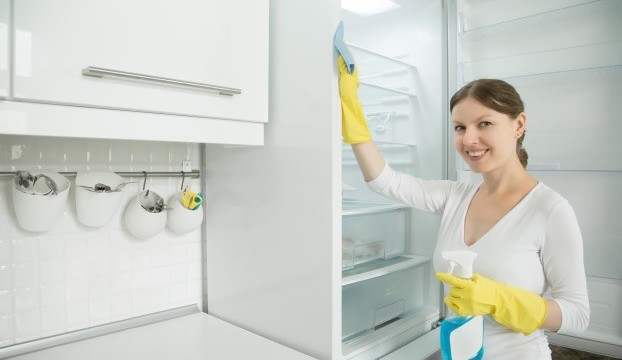
Food poisoning is a very real risk if spillages, mold and bacteria aren’t quickly cleaned away when found in your refrigerator. It can be tempting to minimize cleaning of the fridge, especially when it’s chock full of food and getting to all the nooks and crannies, means taking everything out and having to put it all back in again. Minimal fridge cleaning is perfectly fine, provided it’s clean enough and food is stored hygienically inside, but if you see spillages or food items that have fallen from the shelves or are smeared over the sides, then they should be cleaned up as soon as possible.
Most refrigerators will come with a cleaning manual that you can refer to, and this will give you the best results, but there are also a few simple cleaning tips that you can follow, should you not have a manual:
- Wipe up spills as soon as they happen
This is particularly important in the case of meat juices, to avoid cross contamination. If you’re defrosting meat in your refrigerator, you should do so on the lowest shelf of the fridge and ensure that the meat is in a spill proof container.
- Clean the inside of your fridge without chemicals
A clean sponge and some warm, soapy water should be perfectly sufficient for cleaning the interior of a fridge; try to avoid using harsh chemicals as they can taint any food being stored inside.
- Don’t forget to clean the handle
This part of the fridge can quickly become covered in dirt, grease and bacteria, particularly if little hands have access to it! Clean it regularly with soapy water to prevent grime and dangerous germs from breeding there.
- Get rid of nasty whiffs
You can eliminate odours in your fridge by placing an open box of baking soda right at the back, and then simply change it once every three weeks or so.
- Don’t block the front grill
Try to keep the front grill dust free so that air can flow freely to the condenser, this will give you the best cooling and efficiency results. You can also clean the condenser coils with a vacuum or small brush, but remember to unplug it when you do so.
- Have regular clear outs of your refrigerator
Looking in your fridge at least once a week to see if any food items are past their use by date or spoiling, is a great way of preventing bacteria and keeping your fridge smelling fresh.
For the best results, try to clean your fridge thoroughly at least once a month, and clean up spillages as soon as they occur. A clean and organised fridge is better for your health, and you’ll be able to find food items with greater ease, too!
